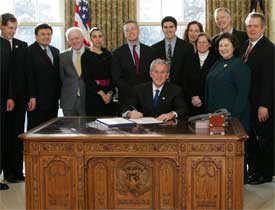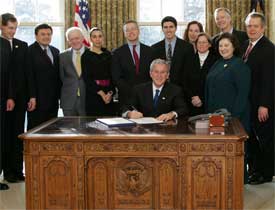 Witnesses signing of trafficking victims protection bill she helped write
Witnesses signing of trafficking victims protection bill she helped write
KINGSTON, R.I.–January 7, 2009— Donna M. Hughes, a professor of women studies at the University of Rhode Island was invited to the White House just before Christmas to witness the signing of the William Wilberforce Trafficking Victims Protection Reauthorization Act of 2008. She met with President George W. Bush and a handful of Cabinet members and Congressional leaders in the Oval office.
Hughes, a leading international researcher on trafficking of women and children, contributed to the passage of the Act, also known as HR 7311.
The bill follows other bills that Hughes has helped pass: the Trafficking Victims Protection Act of 2000, the Trafficking Victims Protection Reauthorization Act of 2003, the Trafficking Victims Protection Reauthorization Act of 2005.
“With each Act we have advanced the anti-human trafficking movement in the U.S. and around the world,” says the respected researcher and advocate.
Trafficking has an astounding number of victims. Citing data provided by the United Nations, Hughes says about 4 million people are trafficked annually either in their countries or across international borders. The URI professor adds that of the approximately 15,000 foreign victims trafficked into the U.S. each year, about 70 percent of them are women and children from East Asia, Latin America, Eastern Europe and Africa. Hughes says the numbers don’t represent the full scope of the problem because many victims are often fearful or unable to come forward.
Hughes worked on several important provisions of the newest Act.
•International trafficking: Each year, the State Department issues a report rating countries on their efforts to combat human trafficking. For years, Hughes has advocated for a focus on the demand for victims—the pimps or sex traffickers who profit and the men who purchase sex acts. The Wilberforce Act creates a stand-alone minimum standard to determine ratings based on whether a country has made “serious and sustained efforts to reduce the demand for commercial sex acts”, whether legal or not under the laws of the country. The URI professor expects this change will have a considerable impact on countries like Germany and the Netherlands that have legalized prostitution and to date have received favorable ratings. This provision also obliges countries to make “serious and sustained efforts to reduce…participation in international sex tourism.”
• Domestic trafficking in or into the U.S.: Previously, for a sex trafficker to be convicted of sex trafficking a minor (under age 18), the pimp had to know the girl (or boy) was under 18. This was a difficult task for prosecutors, especially with foreign victims. Under the Act just passed, no such proof requirement will exist for any defendant who had “reasonable opportunity to observe” the trafficked minor.
• Proving that a victim was subjected to “force, fraud, or coercion” has been difficult, requiring intensive victim testimony. Victims are often too frightened to testify against these often brutal pimps. Therefore, Hughes worked to lower the burden of proof placed on the victim. This was accomplished in several ways:
a) By changing the sentencing guidelines for “alien harboring,” if prostitution is involved. Now proof of force, fraud, or coercion is not needed. A perpetrator can be convicted if the trafficker knows or is “recklessly blind” to the victim’s illegal immigration status.
b) Drug use or addiction is now a form of psychological coercion. If a trafficker or pimp has reason to know that a victim is a drug user, it qualifies as using coercion. Given the high proportion of adult trafficking victims who use or are dependent on drugs, this provision will result in provable liability for a high proportion of traffickers.
c) In the past, conviction of a pimp or trafficker required that they “knew” the victim was going to be used for a commercial sex act. Now, the prosecutor only has to prove “reckless disregard” to knowledge of use for a commercial sex act.
• Model anti-trafficking law for states. The Act requires the Department of Justice to create a new model state law on trafficking. The current model law treats adult prostitution as a “service.” The Wilberforce Act requires the DOJ to assist states in creating a comprehensive approach to sex trafficking, which means reform of current state anti-pimping laws. This should have a significant impact on Rhode Island because the General Assembly passed its anti-trafficking law based on the old model. An expansion of the federal trafficking law will assist the prosecution of traffickers in Rhode Island by criminalizing offsite brothel landlords. In Providence, letters were sent to property owners notifying them that criminal activity was taking place in “massage parlors” operating in their buildings. The letter advised them to evict the tenants. Most landlords ignored the letters. Now, they will be subject to criminal prosecution if they “recklessly disregard” that trafficking is taking place. If a minor victim is involved the offense carries a mandatory minimum sentence of 10 to 15 years.
Hughes is frequently consulted by governments and non-governmental organizations on policy related to women’s human rights, particularly on trafficking of women and girls for sexual exploitation. She has testified before the U.S. House International Relations Committee, the Senate Foreign Relations Committee, the Moscow Duma, and the Czech Parliament.
Her work has been supported by the U.S. State Department, the National Institute of Justice, the National Science Foundation, the Association of American Colleges and Universities, the Norwegian Agency for Development Cooperation, the International Organization for Migration, the Council of Europe, the Coalition Against Trafficking in Women, the Rhode Island Board of Governors for Higher Education, URI Foundation, URI’s Council for Research, and the University of Bradford, United Kingdom.
Pictured above
URI Women’s Studies Professor Donna Hughes is on the right side of Bush, wearing glasses and a white turtleneck. URI Photo courtesy of Donna Hughes

